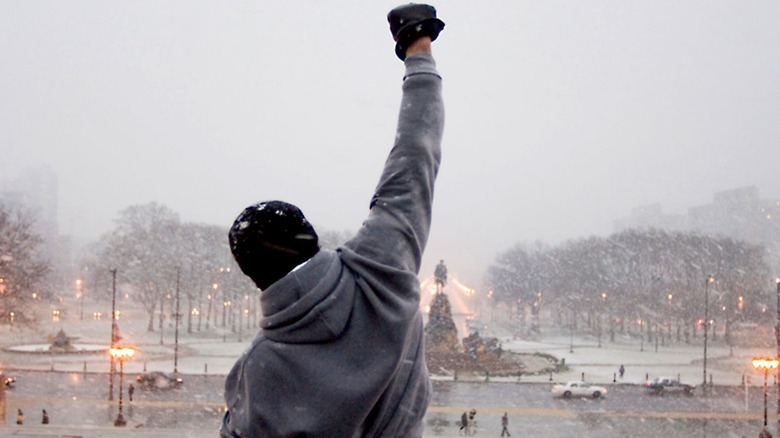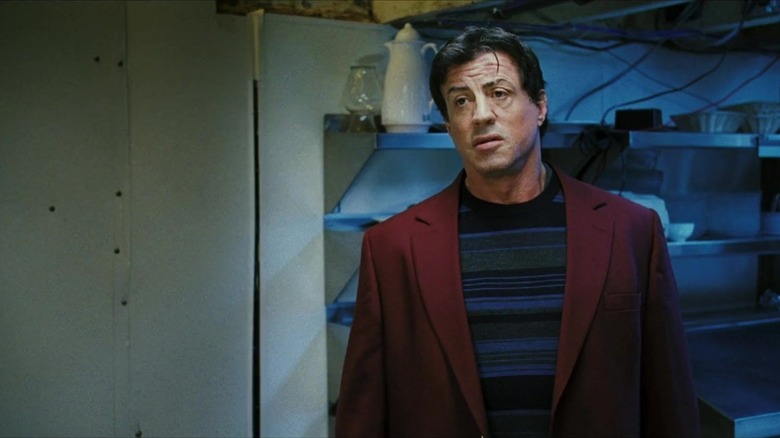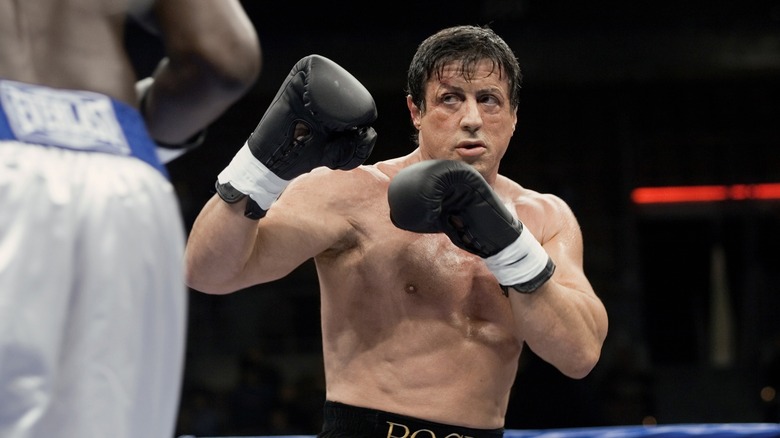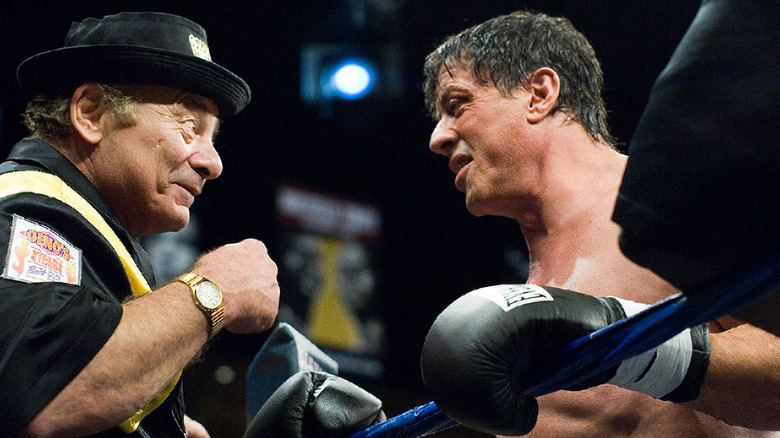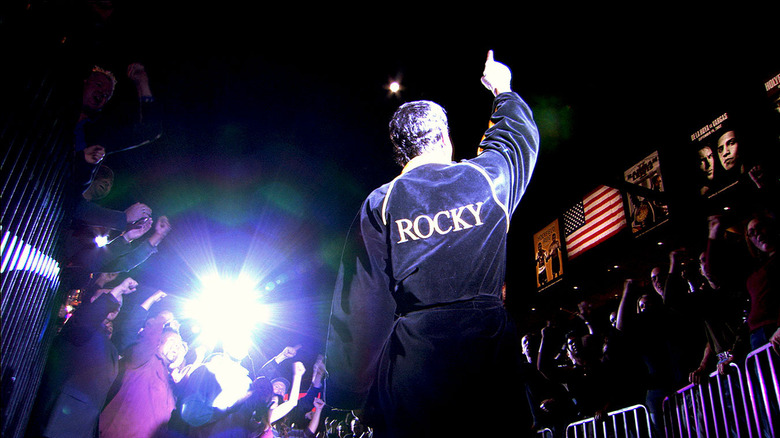Tales From The Box Office: Years Before Creed, Rocky Balboa Saved The Rocky Franchise
(Welcome to Tales from the Box Office, our column that examines box office miracles, disasters, and everything in between, as well as what we can learn from them.)
There are few franchises as enduring and roundly beloved as "Rocky." Sylvester Stallone was a nobody actor who managed to pick himself up by his bootstraps and turn this story of a nobody boxer into a critical darling and box office smash, as well as an enduring piece of Americana. More than that, the perceived quality of this franchise, nearly 50 years after its inception and nine films in, is pretty damn impressive. But before "Creed" came along to revitalize the series for a new generation, it was "Rocky Balboa" that revived it and made the spin-off possible in the first place.
The 2006 film is notable for an array of reasons, most notably that it featured Stallone getting back in the ring at 60 — a premise that almost seems like it could be laughable. Yet, what the actor-writer-director managed to accomplish is downright heartwarming and served to bring the franchise back from the dead, having suffered a brutal death at the hands of the much-maligned (though sometimes defended) "Rocky V" in 1990. But Stallone never gave up, and his determination led to a wildly successful rebirth for the cinematic icon.
In honor of the release of "Creed III," we're looking back at "Rocky Balboa," the ridiculous amount of time it took to actually get it made, how it managed to surprise just about everyone when it finally hit theaters, and what lessons we can extract from it in the modern context. Let's dig in, shall we?
The movie: Rocky Balboa
The "Rocky" films enjoyed a very successful, semi-regular run at the box office from 1976 to 1985, the year that saw "Rocky IV" hit theaters. Stallone had a huge hand in crafting the series, having directed the first three sequels and writing every single film. But Stallone didn't direct "Rocky V" and, by his own admission, he was "negligent" with the film, which ends in a pretty ridiculous street brawl that sees Rocky duking it out with hot-headed boxer Tommy Gunn (the real boxer Tommy Morrison).
Though not altogether unsuccessful ($120 million box office over a $42 million budget), the film was critically panned, and it was crystal clear that Rocky's best days were behind him. Or were they? Around 1996, Stallone started to think that he would rather see his iconic boxer go out on better terms — both for himself and for the audience's sake. Speaking with Entertainment Weekly in 2007, Stallone explained:
"I felt obligated to try and end the series the way it should have ended. I was very negligent [with 1990's] 'Rocky V.' It just didn't leave anyone with any sense of hope. It was very reflective of where I was at the time. So, it bothered me. And then around '96, I thought, Oh, I want to approach Hollywood with the idea. And they said, basically, never. I kept going back and visiting and there was a certain studio head that wanted no part of it."
Luckily, the everything old is new again adage would come around as MGM was sold to Sony in 2004. And, wouldn't you know it? The new owners of the "Rocky" franchise were willing to hear Stallone out about his pitch for "Rocky VI." Or, as it would come to be known by the time it hit theaters, "Rocky Balboa."
Rocky was down, but not out
The film focuses on the reigning heavyweight title holder Mason Dixon (Antonio Tarver) who loses a much-publicized virtual boxing match between himself and long-retired ex-champ Rocky Balboa. Dixon responds by challenging the Italian Stallion to a 10-round exhibition bout. This pulls a wayward Rocky out of retirement for one last go-around in the spotlight.
It cannot be overstated just how dead the franchise seemed after "Rocky V." Not just because that movie was the worst of the bunch, but because professional boxers simply don't have careers in their 60s. Yet, that's how old Stallone was when "Rocky Balboa" finally came together, with him once again writing and directing. Nobody can accuse Stallone of not giving it his all, as he was actually knocked out cold while filming one of the fight scenes. Speaking at the time, the filmmaker explained that the whole idea behind making this film was to buck everyone's skepticism:
"It's all going to be about the message and the skepticism. Because when you reach a certain age people become skeptical about what you can do. You may not have the skill but you have the will and that can drive you through."
One of the most crucial decisions was to kill off Talia Shire's Adrian, Rocky's wife, who had been a huge part of the series since the very beginning. "In the original script, she was alive. But it just didn't have the same dramatic punch," Stallone explained to USA Today at the time. "I thought, 'What if she's gone?' That would cut Rocky's heart out and drop him down to ground zero." Shire, meanwhile, took it all in stride, saying, "I am so in his corner. Sly is so gifted, and the writing in this piece is courageous. It is Rocky's rebirth."
Shire couldn't have known just how right she was about that.
The financial journey
MGM and the producers, despite whatever skepticism existed, had a great deal of confidence in the film that Stallone delivered. As such, they moved the release date up from the President's Day frame in 2007 to the pre-Christmas frame in 2006. That proved to be a wise decision. Quite unlike "Rocky V," the long-awaited "Rocky Balboa" was met with largely positive reviews from both critics and audiences alike. So, when it hit theaters on December 20, it was met with a warm welcome. What's more, the 16 years between installments left just enough room for nostalgia for the character to take root. Ultimately, the long delay worked in its favor.
The film earned nearly $10 million domestic that Wednesday and Thursday, before delivering a very solid $12.1 million opening weekend. That number grew to $17 million when accounting for the Monday Christmas holiday. Given that the sixth installment in the series carried a reasonable $24 million budget, it hardly mattered that it opened in third place behind "Night at the Museum" and "The Pursuit of Happyness." Things were looking very good.
Rocky's return to the big screen held well in the coming weeks, finishing its domestic run with $70.2 million to go with an excellent $85.6 million overseas for a grand total of $156 million worldwide. Earning 6.5 times your budget is, no matter how you slice it, a big win. More importantly, it paved the way for 2015's "Creed," which would go on to earn an even better $173.5 million, as well as a Best Supporting Actor Oscar nomination for Stallone. Oh, and "Creed II" upped the stakes financially yet again with a stellar $213.5 million haul. Very arguably, that wouldn't have been possible without "Rocky Balboa."
The lessons contained within
Setting aside the fact that there has been some bitterness over the years on the part of real-life boxer Chuck Wepner, who Stallone based his first draft of Rocky Balboa on, this franchise and, more specifically, this movie is an example of determination truly paying off. The actor, who was once a premiere action star in the '80s and '90s, had fallen out of favor and was at a low point in his career.
Stallone only had flops such as "Get Carter" and the direct-to-video "Avenging Angelo" to his name in the early 2000s. Yet, 40 years after the fact, "Rocky" once again showed up to save the day for Stallone. Reflecting on the franchise in 2022 on Instagram, Stallone explained that "Rocky Balboa" is actually the most memorable moment in his entire, storied career:
"When people ask what is your most memorable film moment. 'Rocky Balboa,' without a doubt. That was the ultimate challenge. The first 'Rocky of course was amazing' ... But this one was almost [an] impossible dream. I pushed that boulder uphill for 12 long years against overwhelming negativity until it finally happened."
There's an inspiring lesson here in not giving up from an individual perspective, no doubt. But in the era of endless reboots and franchise revivals, there's also one for Hollywood as well. Once-popular things that are dead rarely stay dead, but this movie proves there is a way to revive something the right way. Stallone had a real, creatively fulfilling reason to bring Rocky back — nobody was asking him to do this. There is something to be said for leaning on creative passion, while staying financially responsible, all in the hopes of reclaiming former franchise glory.
